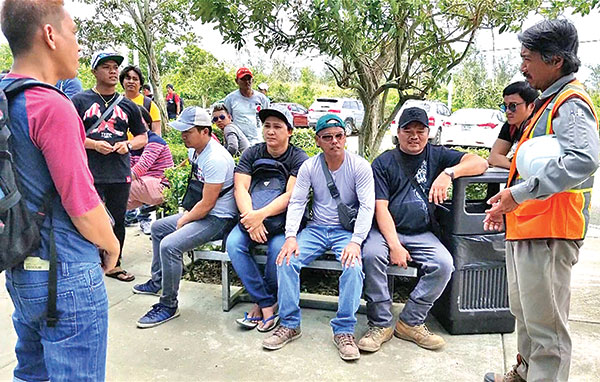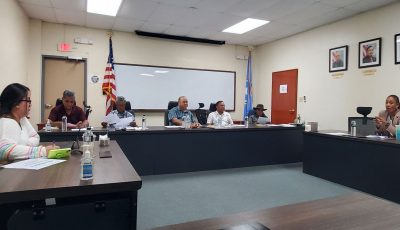Worker issues hound IPI anew
Over 100 rally at US Labor office for nonpayment of salaries

A representative from Imperial Pacific International (CNMI) LLC, right, speaks to Filipino workers under the H-2B visa program to hear their concerns after meeting with U.S. Department of Labor officials yesterday at the Marianas Heights II Building in Puerto Rico. (Jon Perez)
Labor issues continue to create nightmares for Imperial Pacific International (CNMI) LLC, after another group of construction workers staged a protest yesterday at the Marina Heights II Building in Puerto Rico were the U.S. Department of Labor satellite office is located. This was the fourth protest by laborers or employees hired by the casino developer since August, after similar campaigns were staged by separate groups due to various reasons.
The protesters, working as masons ang plumbers, were already given their stop work notices. Two separate groups of construction workers also staged a protest or sought assistance from local and federal labor officials on wage and benefits issues, which was the same sentiment made by employees that were laid off under the casino division of IPI.
Ben Abarrientos, Ian Piel, and Ramil Toring joined more than 100 of their colleagues in visiting the federal labor department to seek assistance from the U.S. agency about their current situation. The group is demanding that the casino developer release their final paychecks that include their salaries and other benefits like the seven-day accrued paid time-off, and issue their return tickets to the Philippines.
All workers are H-2B visa holders and are worried about their current situation following the decision made by the U.S. Department of Homeland Security on Jan. 19, 2019 removing the Philippines under the said program due to potential for abuse, overstay rates, fraud, human trafficking concerns, and other forms of non-compliance. The ban ends on Jan. 18, 2020 and DHS, with U.S. Citizenship and Immigration Services’ help, would again assess the country.
Abarrientos, Piel, and Toring told Saipan Tribune that they and their colleagues are worried that if they remain on Saipan after the Jan. 30 expiration of their respective H-2B work visas, they may be branded as overstayers even if it was not their fault. They could be branded as overstayers if ever they would still be on Saipan a day after their visa expires and that could put a blotch on their record.
Abarrientos said that he was even at the top of the list that would be sent home after he stopped working at the construction site last Jan. 24. However, he hasn’t received his final paycheck and plane ticket despite being scheduled to return to the Philippines at 5:40am yesterday.
“I was scheduled to leave [Monday morning] but I haven’t received my return ticket before my flight. We are ready to leave Saipan and return to our families in the Philippines, so we could apply to work in other countries. Our families already know that we’re already out of work and are waiting for us to come home,” said Abarrientos in Filipino.
“Our H-2B visas are valid only up to the Jan. 30 and DHS has already issued a total ban for the Philippines. What will happen to us if we want to apply and work in another U.S. [jurisdiction] or country after they lift the ban? If we overstay here, it will be part of our permanent record and would be a problem on our side,” added Piel in Filipino.
Endless promises?
Toring said in Filipino that IPI project vice president Spike Dai had assured them last Friday that they would settle all of their concerns at 9:30am on Monday (yesterday), then it was moved to 4:15pm. “We only have less than two days left to legally stay here, [today’s] the 28th. We’re being referred to different persons, who would later tell us to go to another person.”
“Some of us were given notice of our tentative flight back home, then they would inform us that it got cancelled. Some of our colleagues should have left Saipan on Jan. 25 and we really wanted to go home. We do not want to be branded as part of the 40 percent who overstayed according to DHS and USCIS.”
Dai and their foreman, a certain John Taiwanese who also speaks Mandarin, met with them yesterday where they sent two company buses to bring them back to their housing and wait for the meeting where all of their concerns would be addressed. The workers declined and chose to remain outside the MH II building where they wanted to meet IPI representatives with U.S. labor officials.
John, the foreman, even explained to the workers that they could be re-hired by IPI once DHS lifts the H-2B visa ban anytime adding that it could be in the next two months. The ban, however, is for one year with DHS and USCIS going to reassess the country that was removed from the visa program if they have complied with all U.S. immigration laws.
The workers also complained of not being provided food and water. Toring said their barracks’ security guard prevented them from getting food and water since they already stopped working for the company since Jan. 24.
Statements
IPI, in a statement said, they have about 400 construction workers that are under the H-2B visa program that are going to expire by the end of next month. “The H-2B workers from the Philippines cannot presently be extended or recruited to work for IPI under the latest USCIS regulations.”
“In addition, IPI is unable to use the CW-1 program [CNMI-Only Worker visas] for construction workers because of the amendment to the CW law. However, IPI assures the community that it is doing its best to continue with the construction of the project as we continually face these and other challenges.”
Gov. Ralph DLG Torres, in a separate statement sent to the media, said IPI has assured them that all workers are being paid as they continue to address the issues of those whose H-2B visas are going to expire. “From discussions with IPI, all employees are being paid. We have received assurances from their human resources department that the company is reviewing the status of expiring H-visas within the confines of the law.”
“The CNMI Department of Labor is working closely with the U.S. Department of Labor to monitor the situation to ensure compliance and validity of permits,” said Torres, who added that the issue is part of the bigger problem that the CNMI and Guam are facing right now regarding the removal of the Philippines from the H-2B visa program.
“Our access to labor has been limited even before the Commonwealth existed, and our economic viability has been predicated on geographical location for interested workers and investors. The news of the removal of the Philippines from the list of eligible countries is disappointing and surprising,” said Torres.
“This affects our Filipino community who have contributed their lives and service to our islands. This also hampers our recovery efforts as we rebuild homes and build stronger infrastructure that is built to last. [My] administration will continue to remain proactive in addressing this issue with our federal partners by advocating for our viability as an island economy that just wants to succeed for our people.”
Another black eye
House minority leader Rep. Edwin K. Propst (Ind-Saipan) and Rep. Tina Sablan (Ind-Saipan) said the said the labor issue incident is another black eye to the Marianas. Propst and Sablan met with the group also yesterday were they referred them to the Micronesian Legal Services Corp. and Karidat Social Services for further assistance.
“[We] met with a large group of H-2B workers from the Philippines who have not been paid and haven’t gotten their airline tickets yet. Their work visas expire on Jan. 30, two days from now. These workers are broke and can’t even buy food right now,” said Propst.
“It is so heartbreaking and we were told there are about 300 of them altogether who are awaiting their final paychecks and a ticket back home to the Philippines. An IPI representative said they will get paid by 4pm [yesterday]. We hope they deliver on their promise.”
Sablan added that he and Propst met with the group after hearing their sad plight. “We went to meet them to listen to their concerns. Once again, we heard stories of yet another sudden, mass layoff at IPI with very little information provided to the workers about their rights. They said they are all owed money and repatriation tickets. They are all construction workers. They say there are hundreds of them affected and they have no food or water at their barracks.”
“This is just the latest in a series of layoffs at IPI these past few months—of construction and non-construction workers, foreign nationals and U.S. citizens alike. Meanwhile, IPI has been advertising these past few weeks once again for over 1,600 construction-related positions, many of which were occupations affected by the recent layoffs.”
She said that IPI is obligated to abide by the contracts they signed with their workers that is required by U.S. and CNMI labor laws. “They owe these workers their full pay and repatriation tickets. And they also owe our government and the people of the Marianas an explanation, and how they plan to complete their project as required by the terms of the exclusive casino license we have given them. I feel sorry for these workers.”
In a late afternoon message to the Saipan Tribune, Rep. Tina Sablan said she was informed by Propst that the workers were not paid.
“One of the workers called [Propst] and said they were not paid at 4pm as promised,” she said.



























